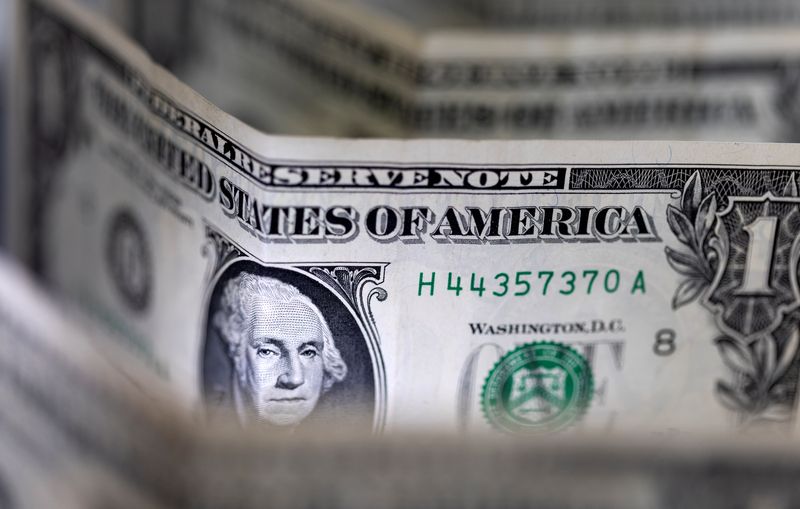LONDON (Reuters) - A tumultuous first quarter is coming to an end and the "buy everything" party is in full swing across markets, but the coming week has a few reality checks that even the most avid bulls may not be able to overlook.
The strong dollar is giving major Asian central banks a headache and there are big questions to answer over the state of growth in the United States, China and the euro zone - the world's three largest economic blocs. Some big data releases might answer them.
Here's your weekahead primer in world markets from Lewis Krauskopf in New York, Rae Wee in Singapore and Dhara Ranasinghe and Amanda Cooper in London.
1/ SCORES ON THE DOORS
The dawn of Q2 is different to the first quarter. In January, markets priced in almost six rate cuts from the Federal Reserve this year - a total of nearly 150 basis points. Now, just three are baked in.
Confidence in a soft landing has ignited an "everything rally" that has swept stocks, gold and cryptocurrencies to record highs.
The dollar, meanwhile, is riding high against almost every major currency, pushing central banks, including those of Japan, China and India, to intervene, or consider intervening, to bolster their currencies.
With the shift in the global interest-rate cycle, low yielding assets are out and everything with a whiff of yield is in. The coming quarter will be the ultimate litmus of whether this view is right.
2/ JOBS DAY
The April 5 U.S. jobs report will test investor confidence that the economy will be able to avoid a recession even as inflation cools off.
Non-farm payrolls are expected to have climbed by 200,000 in March, according to economists polled by Reuters. That would be a step down from the 275,000 jobs added in February.
Hopes for a "soft landing" for the U.S. economy appeared to grow after the Fed at its March meeting backed its view of three rate cuts this year while raising its economic growth estimate.
But concern remains about a potentially too-hot economy, with consumer price data earlier in the year coming in higher than expected.
3/ INTERVENTION WATCH
Monetary authorities in Japan and China are on high alert as their currencies weaken past levels that they've been defending for months, largely thanks to the resurgent dollar.
With the yen faltering towards the 152 per dollar level and the yuan struggling to break above the stronger side of 7.2 per dollar, officials have stepped up efforts to stem any further depreciation.
In Japan, that means verbal warnings, while in China it has been state banks buying yuan and selling dollars.
Given how much the two big Asian currencies have fallen, there's a growing school of thought that Beijing could have grown more tolerant of a weak yuan to maintain its competitive edge against the yen.
It's hard to say for sure, and what comes next for both is as much of a mystery. The answers lie in Tokyo and Beijing.
4/ HOW CONFIDENT?
Markets are certain the ECB will likely cut rates by a quarter point come June. Yet there's some doubt as to whether big central banks will be able to ease policy as much as anticipated overall.
So, while the ECB has more or less pre-committed to a June cut, Wednesday's flash March inflation number could be telling for the rate outlook.
Spain's consumer price index rose 3.2% in March from a year earlier, in line with economists' forecasts but up from 2.8% in February, preliminary data showed this week.
Inflation needs to fall further to allow the ECB to deliver a summer rate cut, making the next three inflation prints key for markets (and the ECB).
If inflation surprises higher, rate cut bets will be pushed out further still. Don't rule that out.
5/ STILL WAITING
A strong rebound in China's economy has been a long time coming and investors aren't pinning much hope on the latest set of Purchasing Managers' Index (PMI) figures to paint a different picture.
Expectations are for the Caixin manufacturing PMI to show a slight expansion, likely continuing its divergence with the official reading - overall offering a mixed outlook for the world's No.2 economy.
While upbeat industrial profits may have offered some relief, a property crisis and various domestic headwinds are keeping foreign money on the sidelines.

Also in an attempt to restore business confidence, President Xi Jinping met American business leaders in Beijing, though there was little detail of what was discussed.
Still, investors want China to walk the talk. Calls for further monetary and fiscal stimulus are still met with much reticence, and that's hurting stocks and the yuan.